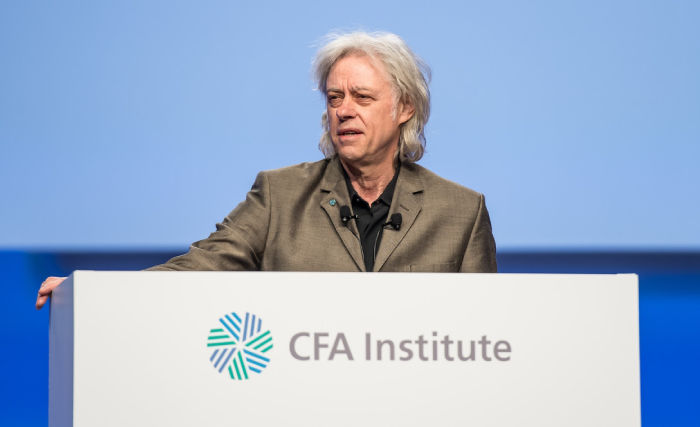Sir Bob Geldof is urging investors to wake up and invest in an ignored Africa, saying the region has promise.
Speaking to a room full of investment professionals from around the world at the CFA Institute’s 69th annual conference held in Montreal on May 11, the Boomtown Rat’s frontman, political activist, songwriter and founder of the 8 Miles Fund said the financial sector has ignored two billion Africans. Geldof said Africa has been left out of the global chess match and he compared the situation to a game of checkers where pieces are jumped over.
“It bodes well to look at the part of the world that normally does not swim with our economic ken, but finds a way to do new things,” said Geldof, who, in 1984, in response to the famine in Ethiopia wrote and performed the song Do They Know It’s Christmas? with other artists under the name Band Aid.
With the market the way it is, he believes investors need to look further and he went as far to say, investors aren’t even doing their job correctly, otherwise they’d be in Africa already.
“Where else are you going to go in the current world that offers you the sort of returns that Africa is offering? Are you in commodities? Are you in equity? Look at the market…. its crap. The job of you guys is to take care of your clients’ money. Surely you’ve got researchers down there that can answer these questions and if you haven’t, are you doing your job?” he asked.
With a massive write-off of African debt from G7 nations in 2005, it has allowed the continent to grow with new hope Geldof explained, but he remains appalled at investors for not showing interest despite there being more tension and corruption elsewhere than in Africa.
“Why are investors not investing in Africa? The data is there, but you lot never look at it. Weird,” he commented.
Sit up and listen
Geldof said investors won’t be able to ignore Africa much longer, so they better sit up and listen. “We’re all going to Africa, whether you like it or not.”
Geldof noted that 60 per cent of unfarmed agricultural land remaining is in Africa, and we will need to invest in that land if we want to feed ourselves. He says one of the main obstacles to investing in Africa is instability, specifically terrorist groups funded by Middle Eastern countries.
Geldof’s message was simple, “Invest in Africa.”
“There is only one place left on Earth where growth can start from almost zero! Why don’t you do it? The richest African did not make his fortune in tech, he made it by selling flour and cement. Put it another way, returns can be had for low risk,” he said.
Geldof says there are many ways to invest in Africa and a lot of Canadians mining companies do so through their projects around Africa; but investors can also invest their cash in African companies that need capital.
The place where he sees the biggest investment opportunities are deals between $15- and $25 million in the consumer space, not only in companies that produce goods, but also in banking, insurance and other financial services.
Still, he says abandoning foreign aid is not the way to go as it is the easiest way for governments to establish “soft power” that later pays off.
“It’s the best spend you’ll ever get for return on minimal investment,” he said. “Soft power in this continent that will be absolutely critical in the 21st century.”
Geldof says he has proof on getting great investment returns after he founded the 8 Miles Fund (named after the distance between the Europe and Africa). 8 Miles is a private equity firm, which invests solely in Africa after being pressured into giving it a go as a way of making some impact. Some of the prominent invests include Uganda’s Orient Bank Ltd., Egypt’s Eagle Chemical Group and the Awash Wine Share Company in Ethiopia.
He says there is no other place in the world where investors get the same return as in Africa. His firm has seen a 25 per cent internal rate of return after raising US$300 million in the last several years.
Cause for concern
Geldof is becoming increasingly worried that the horrors of the mid-1980s will return because of a rapidly expanding population; desertification; a lack of basic necessities, such as seeds to plant and more infrastructure to support these nations.
“I went the mountains and I was out in the countryside, visiting some of the villages because there are 10.5 million people suffering malnutrition and if they cannot plant seeds now for crops, we are going to go back to those pictures of thirty years ago,” says Geldof.
“Education, health, roads, rail have revolutionised the entire region. 50 per cent of Africans have mobile phones and it is the fastest growing region in the world for phones.”
But despite all of these challenges, many African nations experience economic growth in the high single digits year in and year out, Geldof says.










